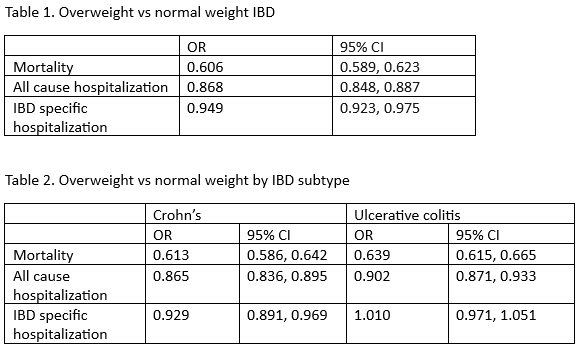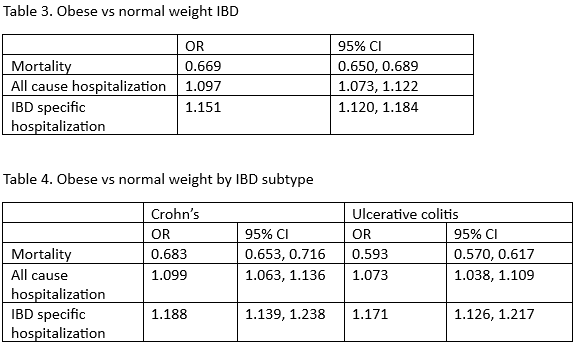Monday Poster Session
Category: IBD
P3202 - Unraveling the Obesity Paradox in Inflammatory Bowel Disease: A Retrospective Cohort Study
Monday, October 27, 2025
10:30 AM - 4:00 PM PDT
Location: Exhibit Hall
- UB
Umesh Bhagat, MD
Cleveland Clinic Foundation
Cleveland, OH
Presenting Author(s)
Umesh Bhagat, MD1, Ankit Agrawal, 2, Bala Pushparaji, MD3, Jean-Paul Achkar, MD, FACG2
1Cleveland Clinic Foundation, Cleveland, OH; 2Cleveland Clinic, Cleveland, OH; 3Case Western Reserve University / MetroHealth, Cleveland, OH
Introduction: The “obesity paradox” suggests that, despite a higher baseline risk for adverse health outcomes, obese patients can experience lower complication and mortality rates in chronic conditions such as inflammatory bowel disease (IBD). This study aims to examine the association between obesity and inpatient outcomes of IBD patients.
Methods: We conducted a retrospective cohort study using the multi-institutional TriNetX research network to evaluate the risk of adverse outcomes in patients with IBD based on BMI. These patients were divided three cohorts based on BMI: normal BMI cohort (< 25 kg/m2), overweight cohort (≥25.0 to 29.9 kg/m2) and obese cohort ( >30.0 kg/m2). Underweight (< 18 kg/m2), patients were excluded from the analysis. One-to-one propensity score matching was performed based on demographics and IBD specific medications. Outcomes were reported as adjusted odds ratios (aOR) with 95% confidence intervals (CI).
Results: A total of 665,254 patients with IBD were included in the study, out of which 174,233 had normal weight, 152,830 were overweight and 159,864 were obese. When comparing the overweight cohort to the normal weight cohort, there was decreased odds of mortality (aOR 0.60, p < 0.01), all cause hospitalization (aOR 0.86, p < 0.01) and IBD specific hospitalization (aOR 0.94, p < 0.01); Table 1. In subgroup analysis by IBD subtypes (Table 2), Crohn’s disease (CD) had similar decrease in mortality, all cause hospitalization and CD specific hospitalization. In contrast, ulcerative colitis (UC) had no difference in UC specific hospitalization (aOR 1.01p = 0.61) but decrease in mortality and all cause hospitalization. When comparing the obese cohort to the normal weight cohort, there was decrease in all-cause mortality (aOR 0.66, p < 0.01), but increased odds of all cause (aOR 1.09, p < 0.01) and IBD specific hospitalization (aOR 1.15, p < 0.01); Table 3. On comparing the IBD subtypes both UC and CD had similar decrease in mortality but increased odds of all cause and disease specific hospitalization (Table 4).
Discussion: Our results show that an obesity paradox may exist in IBD in terms of mortality, but is not consistent across all outcomes. The paradox is more apparent in overweight patients than those with obesity. Future research examining a broader spectrum of outcomes is warranted to more accurately characterize the role of obesity in IBD prognosis.

Figure: Overweight vs Normal weight in IBD

Figure: Obese vs Normal weight in IBD
Disclosures:
Umesh Bhagat indicated no relevant financial relationships.
Ankit Agrawal indicated no relevant financial relationships.
Bala Pushparaji indicated no relevant financial relationships.
Jean-Paul Achkar indicated no relevant financial relationships.
Umesh Bhagat, MD1, Ankit Agrawal, 2, Bala Pushparaji, MD3, Jean-Paul Achkar, MD, FACG2. P3202 - Unraveling the Obesity Paradox in Inflammatory Bowel Disease: A Retrospective Cohort Study, ACG 2025 Annual Scientific Meeting Abstracts. Phoenix, AZ: American College of Gastroenterology.
1Cleveland Clinic Foundation, Cleveland, OH; 2Cleveland Clinic, Cleveland, OH; 3Case Western Reserve University / MetroHealth, Cleveland, OH
Introduction: The “obesity paradox” suggests that, despite a higher baseline risk for adverse health outcomes, obese patients can experience lower complication and mortality rates in chronic conditions such as inflammatory bowel disease (IBD). This study aims to examine the association between obesity and inpatient outcomes of IBD patients.
Methods: We conducted a retrospective cohort study using the multi-institutional TriNetX research network to evaluate the risk of adverse outcomes in patients with IBD based on BMI. These patients were divided three cohorts based on BMI: normal BMI cohort (< 25 kg/m2), overweight cohort (≥25.0 to 29.9 kg/m2) and obese cohort ( >30.0 kg/m2). Underweight (< 18 kg/m2), patients were excluded from the analysis. One-to-one propensity score matching was performed based on demographics and IBD specific medications. Outcomes were reported as adjusted odds ratios (aOR) with 95% confidence intervals (CI).
Results: A total of 665,254 patients with IBD were included in the study, out of which 174,233 had normal weight, 152,830 were overweight and 159,864 were obese. When comparing the overweight cohort to the normal weight cohort, there was decreased odds of mortality (aOR 0.60, p < 0.01), all cause hospitalization (aOR 0.86, p < 0.01) and IBD specific hospitalization (aOR 0.94, p < 0.01); Table 1. In subgroup analysis by IBD subtypes (Table 2), Crohn’s disease (CD) had similar decrease in mortality, all cause hospitalization and CD specific hospitalization. In contrast, ulcerative colitis (UC) had no difference in UC specific hospitalization (aOR 1.01p = 0.61) but decrease in mortality and all cause hospitalization. When comparing the obese cohort to the normal weight cohort, there was decrease in all-cause mortality (aOR 0.66, p < 0.01), but increased odds of all cause (aOR 1.09, p < 0.01) and IBD specific hospitalization (aOR 1.15, p < 0.01); Table 3. On comparing the IBD subtypes both UC and CD had similar decrease in mortality but increased odds of all cause and disease specific hospitalization (Table 4).
Discussion: Our results show that an obesity paradox may exist in IBD in terms of mortality, but is not consistent across all outcomes. The paradox is more apparent in overweight patients than those with obesity. Future research examining a broader spectrum of outcomes is warranted to more accurately characterize the role of obesity in IBD prognosis.

Figure: Overweight vs Normal weight in IBD

Figure: Obese vs Normal weight in IBD
Disclosures:
Umesh Bhagat indicated no relevant financial relationships.
Ankit Agrawal indicated no relevant financial relationships.
Bala Pushparaji indicated no relevant financial relationships.
Jean-Paul Achkar indicated no relevant financial relationships.
Umesh Bhagat, MD1, Ankit Agrawal, 2, Bala Pushparaji, MD3, Jean-Paul Achkar, MD, FACG2. P3202 - Unraveling the Obesity Paradox in Inflammatory Bowel Disease: A Retrospective Cohort Study, ACG 2025 Annual Scientific Meeting Abstracts. Phoenix, AZ: American College of Gastroenterology.
